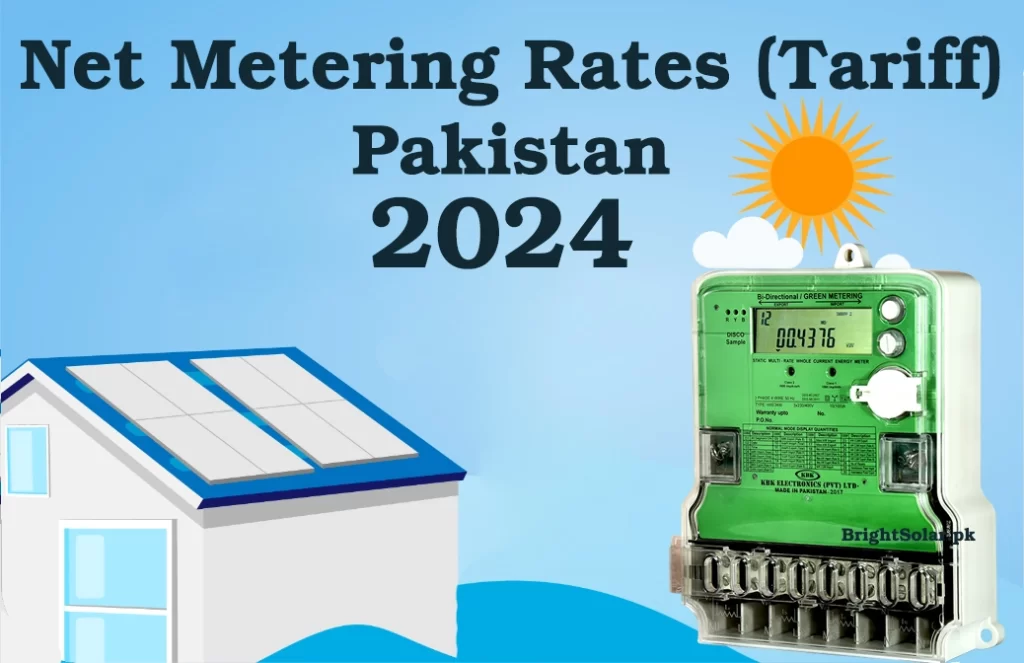Last updated on January 5th, 2025 at 03:20 pm
In Pakistan, net metering costs differ based on the user type and system size. Industrial customers incur higher costs than residential customers due to project size variations. Residential net metering rates in Pakistan depend on two factors: the meter cost remains constant, while documentation and process charges vary based on the project size.
The current net metering tariff in Pakistan is Rs. 19.32 per kilowatt-hour (kWh). This tariff plays a crucial role in assessing the financial benefits and feasibility of adopting net metering, governing the exchange of electricity between consumers and the National Electric Power Regulatory Authority (NEPRA).
If you do not know about net metering, check out the complete information on solar net metering in Pakistan.
Understanding Peak And Off-Peak Hours
Electricity tariff, or net metering tariff in the context of net metering, refers to the specific rate at which electricity is bought or sold. Off-peak rates, offered during times of lower electricity demand like late evening or early morning, come at a lower cost. In contrast, peak rates, applied during high-demand periods (usually 5 pm – 10 pm), incur higher charges for electricity consumption. Understanding and managing these rate differentials are key considerations for effective net metering strategies.
This tariff is often set and regulated by authorities such as the National Electric Power Regulatory Authority (NEPRA) in Pakistan. Understanding and staying informed about the net metering tariff is essential for individuals and businesses engaging in solar energy generation and consumption.
Billing Cycle
Electricity supply companies calculate bills quarterly. If your total export exceeds the total import, your bill is carried forward. For example, if your export in January is higher, the remaining units are carried forward, and the same process happens in February and March, with the final adjustment in March. The bill undergoes a final calculation, and if your exports are higher for three months, the excess amount is credited.
- January – March
- April – June
- July – September
- October – December
Current Net Metering Tariff 2025
| Peak Hours Rates By DISCO | Rs 41.89 |
| Off-Peak Hours Rates By DISCO | Rs 35.57 |
| Purchase By DISCO | Rs 19.32 |
Bill Calculation

If the exported units are more than the imported units.
- Net units exported by me in peak hours are = 108
- Net units imported by me in off-peak hours are = 477
- Net units exported by me in off-peak hours are = 734
- Exported units (734) – Imported Units (477) in off-peak hours = -247 units * 19.32 (Rs) = -4772 rupees (Pay to consumer). Note: 247 units were purchased by the Electricity distributor.
- Exported units (0) – Imported Units (108) in peak hours = 108 units * 41.89 (Rs) = 4524 rupees (Pay to electricity provider)
- Off-peak price (-4772 Rs) – peak price (4524 Rs) = -248 Rs (Credited)
If the exported units are less than the imported units.
- Net units exported by me in peak hours are = 108
- Net units imported by me in off-peak hours are = 1000
- Net units exported by me in off-peak hours are = 734
- Exported units (734) – Imported Units (1000) in off-peak hours = 266 units * 35.57 (Rs) = 9462 rupees
- Exported units (0) – Imported Units (108) in peak hours = 108 units * 41.89 (Rs) = 4524 rupees
- Cost Of Electricity: Off-peak price (9462 Rs) + peak price (4524 Rs) = 13986 Rs (Pay to electricity provider)
- Add (Adjustment and Taxes)
Summary
Net metering in Pakistan empowers households and businesses to generate their electricity, fostering a cleaner and more sustainable energy landscape. At the prevailing net metering tariff of 19.32/kWh, consumers enjoy financial savings, a quicker payback period, and enhanced energy independence. Though progress is incremental in the solar sector, it signifies a meaningful step forward.




